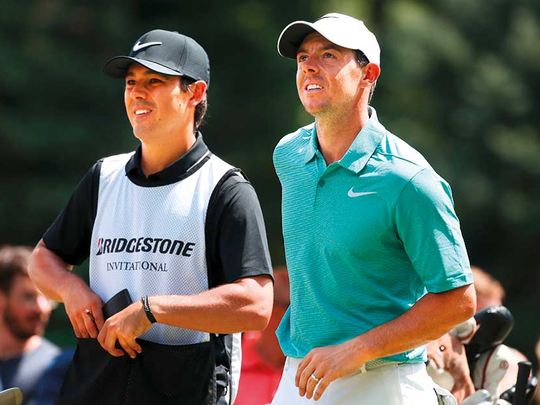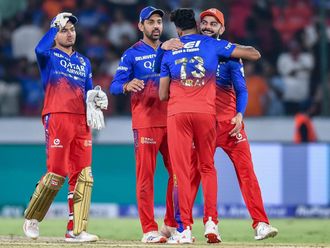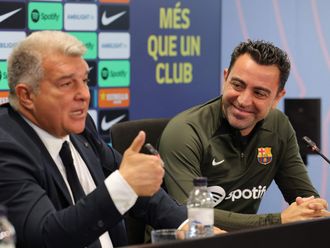
Charlotte, North Carolina: If Rory McIlroy could have picked any venue in the world to stop Jordan Spieth from beating him to the career grand slam then, be sure, it would have been Quail Hollow.
Imagine Cristiano Ronaldo getting the option to deny Lionel Messi his latest history charge at the Bernabeu, Roger Federer likewise Rafael Nadal at Wimbledon, Lewis Hamilton being able to slap down Sebastian Vettel at Silverstone.
This week’s US PGA Championship course is at McIlroy’s backyard. It is his Hollow.
It has been ever since he broke his PGA Tour duck there in the Wells Fargo Championship of 2010 and so announced himself as a golfer of significance to America at large.
From 2012 to 2016, McIlroy finished in the top 10 at the course on each occasion, notching up another victory — this time by seven shots — in 2015, a second place — after being beaten in a play-off by Rickie Fowler — in 2012 and a fourth in 2016.
It is not quite Red Rum at Aintree or, indeed, Tiger Woods at so many of his personal fiefdoms, but consider that in this golfing age of parity, McIlroy has won more than pounds 3 million at this regular tour stop alone.
It is fair to say he has been eagerly waiting for the city of Charlotte to host this major.
“There’s been a couple of venues that I’ve earmarked as places I would have a great chance of winning a major when I’ve seen the schedules,” McIlroy said.
Rory McIlroy plays a shot on the eighth hole during the final round of the World Golf Championships — Bridgestone Invitational at Firestone Country Club South Course in Akron, Ohio. |
“St Andrews was one in 2015 and that went really well for me didn’t it? Smashing up my ankle in a kickabout 10 days before.
“But Quail Hollow this year was obviously the other one and I told myself to make sure I wasn’t playing any football leading up to it. Yeah, it’s been on my mind for a while — this is one I’ve a good opportunity at. It’s a special place for me.”
Indeed, the George W Cobb design was not only the scene for one of McIlroy’s most important victories but also one of his most important shots.
Who knows what would have happened if that four iron from 206 yards into the breeze and over a lake had gone awry?
Certainly, the scenario was urgent for the then slightly podgy young Ulsterman. He had missed his last two cuts, the latter of which just happened to be at the Masters, and he was two shots above the cutline late on Friday afternoon with only three to play.
McIlroy was in danger of having to celebrate his 21st birthday the following Tuesday on the back of a hat-trick of missed cuts.
But then came the par-five seventh (his 16th) and there followed that nerveless approach to five feet to set up the tournament-saving eagle.
McIlroy made the cut on the number and thereafter produced a magical 66-62 weekend to beat Phil Mickelson by four strokes.
“A quite amazing talent,” Mickelson, then the reigning Masters champion, said.
The 40-footer for birdie to break the course record on the 18th, complete with the unforgettable punch into the air, was duly shown on loop on ESPN Sports Center and a freckle-faced superstar was born.
“At that point in my career it was definitely the most significant week and, of course, it would not have been possible without that four iron,” McIlroy told me.
“I had won on the European Tour at the Desert Classic the year before and, even though that was 15 months before, I’d had a bunch of top threes and was established on that tour. But the PGA Tour was something else.
“A lot of Europeans go over to America with big reputations and struggle to win. So to go over and get a win early did wonders for my self-belief. It gave me the confidence to know if I went over more I would have good chances. I’m not sure, that because of the context and everything, I’ve ever played a better round than that 62. It was four shots better than the next best. That Sunday proved to me that I could play with the best and beat them. It was a big moment for me.”
It was a big moment for golf. Within a year, McIlroy was a major champion and soon he was to be world No. 1.
Of course, it has not been the uninterrupted, undisputed hegemony everyone foresaw, but then, with McIlroy it never does follow the script.
This past few days he has been playing in the WGC Bridgestone Invitational with his best friend, Harry Diamond, on the bag, having sacked his long-time caddie JP Fitzgerald in the wake of finishing fourth at the Open two weeks ago. Clearly it is not advisable to take on a novice caddie in the build-up to a major, particularly when you are facing the prospect of a third majorless season.
But McIlroy did so comfortable in the knowledge that he is intimately aware of his way around Quail Hollow, even if it has been renovated in the past 15 months.
“We were at a wedding there last summer so I got to play it after they’d made all the changes,” McIlroy said.
“It wasn’t quite bedded in, but I’m sort of familiar with the alterations. It’s funny, I was begging Johnny Harris [the club president] a couple of years ago, ‘Why are you changing it? Please, just keep it the same’. But essentially it’s the same course, the same shots you’ll need to hit. And it’s not going to be too much different just because it’s a different tournament and is a major.”
Yet while everyone knows the 7,442-yarder suits McIlroy, it does not necessarily follow that Spieth, a completely different golfer, will be at an unbreachable disadvantage. Yes, the only time he has played at Quail Hollow was in 2014 when he finished in a tie for 32nd, but if Royal Birkdale told us anything it was that Spieth’s mental agility and resilience makes him a threat anywhere and at any time.
Perhaps North Carolina will witness an epic confrontation between Spieth’s mind and McIlroy’s heart. “It’s not just 2010 which makes it such an inviting place for me,” McIlroy said. “Because just driving into Quail Hollow, you’ve got the driveway that looks a little bit like Magnolia Lane [at Augusta]. I’ve always enjoyed Charlotte, it’s a great city with a good feel to it. What can I say? It just does it for me.”
— The Telegraph Group Ltd, London 2017








